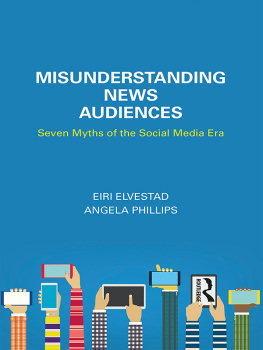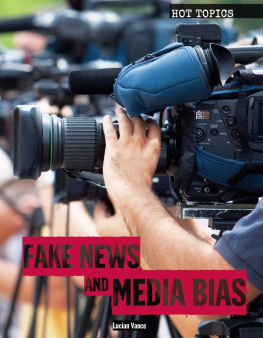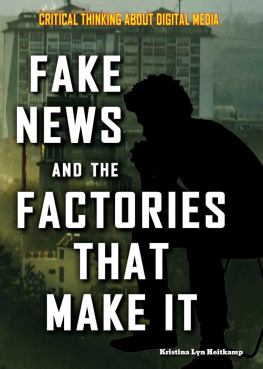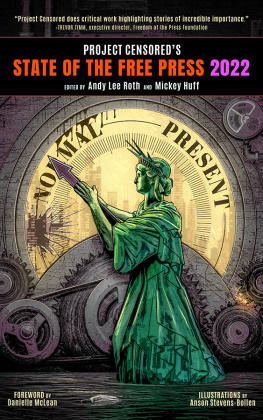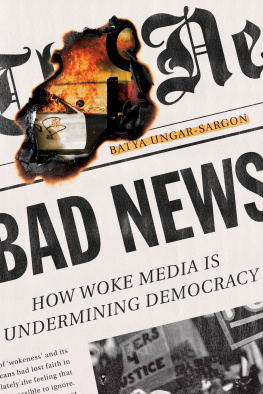LOSING THE NEWS

Institutions of American Democracy
Kathleen Hall Jamieson and Jaroslav Pelikan, Directors
Other books in the series
Schooling in America: How the Public Schools Meet the Nations Changing Needs
Patricia Albjerg Graham
The Most Democratic Branch: How the Courts Serve America
Jeffrey Rosen
The Broken Branch: How Congress Is Failing America and How to Get It Back on Track
Thomas E. Mann and Norman J. Ornstein
LOSING THE NEWS
THE FUTURE OF THE NEWS THAT FEEDS DEMOCRACY
ALEX S. JONES




Oxford University Press, Inc., publishes works that further Oxford Universitys objective of excellence in research, scholarship, and education.
Oxford New York
Auckland Cape Town Dar es Salaam Hong Kong Karachi
Kuala Lumpur Madrid Melbourne Mexico City Nairobi
New Delhi Shanghai Taipei Toronto
With offices in
Argentina Austria Brazil Chile Czech Republic France Greece
Guatemala Hungary Italy Japan Poland Portugal Singapore
South Korea Switzerland Thailand Turkey Ukraine Vietnam
Copyright 2009 by Oxford University Press, Inc.
Published by Oxford University Press, Inc.
198 Madison Avenue, New York, New York 10016
www.oup.com
Oxford is a registered trademark of Oxford University Press
All rights reserved. No part of this publication may be reproduced, stored in a retrieval system, or transmitted, in any form or by any means, electronic, mechanical, photocopying, recording, or otherwise, without the prior permission of Oxford University Press.
Library of Congress Cataloging-in-Publication Data
Jones, Alex S.
Losing the news : the future of the news that feeds democracy / Alex S. Jones.
p. cm. (Institutions of American democracy)
Includes bibliographical references and index.
ISBN 978-0-19-518123-4
1. JournalismPolitical aspectsUnited States.
2. JournalismEconomic aspectsUnited States.
3. JournalismObjectivityUnited States.
4. Journalistic ethicsUnited States.
I. Title.
PN4888.P6.J66 2009
071.3dc22 2009018385
1 3 5 7 9 8 6 4 2
Printed in the United States of America
on acid-free paper
FOR SUSAN
Alice: Would you tell me, please, which way I ought to go from here? Cheshire Cat: That depends a good deal on where you want to get to.
Lewis Carroll, Alices Adventures in Wonderland
CONTENTS
CHAPTER 1
The Iron Core
CHAPTER 2
Media and Democracy
CHAPTER 3
The Fragile First Amendment
CHAPTER 4
Objectivitys Last Stand
CHAPTER 5
Media EthicsThe Painful Balance
CHAPTER 6
The Curious Story of News
CHAPTER 7
Newspapers on the Brink
CHAPTER 8
The New News Media
CHAPTER 9
Saving the News
ACKNOWLEDGMENTS
The origin of this book was an invitation to write it from Kathleen Hall Jamieson and Geneva Overholser in their capacity as coeditors of The Press, a part of the American Institutions of Democracy series of books published through a partnership of Oxford University Press and the Annenberg Foundation Trust at Sunnylands. Losing the News is also part of that series and a complement to The Press, which is a collection of scholarly essays that examine the history, identity, roles and future of the American press.
Their confederate in conceiving what became Losing the News was Tim Bartlett, who was the books first editor at Oxford University Press and was instrumental in framing what it should be. When Tim left Oxford, it passed into the extraordinarily capable hands of David McBride, who has been its principal guide and editor. But it has also been encouraged and enabled by an array of people at Oxford who believed it had an important message and have been enormously forbearing and supportive throughout. I especially wish to thank Niko Pfund, Oxfords academic and trade division publisher, for his commitment to seeing that the book was published well, and Keith Faivre, Sarah Russo, and Steve Dodson for their special efforts on my behalf.
I am grateful to friends who read the manuscript and offered guidance and corrections: Tom Patterson, Steve Oney, Nancy Palmer, John Carroll, Dan Okrent, Dudley Clendinen, Fred Schauer, Floyd Abrams, Nicco Mele, Camille Stevens, and Laurel Shackelford, whose rigor saved me many times.
My superb associates at the Joan Shorenstein Center on the Press, Politics and Public Policy at Harvard Universitys Kennedy School of Government, and Walter Shorenstein, the centers principal benefactor, have been my allies throughout.
I am also most grateful to Kathy Robbins and David Halpern, my agents, who were my allies from the start and contributed their counsel as well as their editorial wisdom.
It is important also to thank some particular people who inspired me along the way: Arthur Gelb, Joel Fleishman, Eugene Patterson, my late grandmother, Edith OKeefe Susong, and my parents, John M. and Arne Jones.
Throughout the making of Losing the News, I have had the support of family and friends too numerous to mention, but who are most appreciated and loved. They bolstered me in some dark days and were essential.
I wish also to say that I have drawn strength from my fellow journalists, who share many of my concerns, if not always my views. You are my colleagues.
Finally, I thank Susan Elizabeth Tifft, who is my first and last reader, my trusted editor, my boon companion and friend, and my beloved wife.
PROLOGUE: THE CRISIS
My best moment as a journalist took place in January 1986, around 3 A.M. in a hotel room that reeked of cigarette smoke and was littered with half-eaten sandwiches and abandoned glasses of watery iced tea. I was in the Hyatt Hotel in Louisville, Kentucky, and for five days had been working on a story about why the Binghams, the towns most famous family, had abruptly decided to sell the newspapers that had made them Kentuckys first citizens. Family strife had prompted the sudden announcement of the sale of the Courier-Journal and the Louisville Times, and I had immediately caught a plane to Louisville to cover the story for the New York Times. My beat was the press itself.
The collapse of the Bingham empire was big news because the Courier-Journal was regarded as perhaps the nations finest and most honored regional paper. It was also a catastrophe to the nations dwindling number of newspaper-owning families, who had looked at the Binghams as a model of success and determination to remain independent of chain ownership.
From my perspective, it was also a great story, and, after writing two fast articles, Id fought with my editor in New York for the chance to stay in Louisville to report and write a longer, more penetrating account of what had happened to this family. My editor was reluctant because I had been at the Times for only two years. He had a far more seasoned person in mind for the job, but I fought for it and managed to persuade him to give me my chance. For five days I interviewed frenetically, talking to everyone I could reach who might shed light on why this family had come apart. At night I wrote and rewrote a piece that eventually swelled to more than 6,500 words, which was practically novelistic by
Next page

